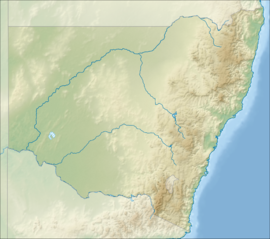Lion Island (New South Wales)
 View of Lion Island from Iron Ladder Beach | |
 | |
| Geography | |
|---|---|
| Location | Broken Bay |
| Administration | |
Australia | |
| State | New South Wales |
| Lion Island Nature Reserve New South Wales | |
|---|---|
 Sunset view of Lion Island | |
| Nearest town or city | Gosford |
| Coordinates | 33°33′25″S 151°19′04″E / 33.55694°S 151.31778°E |
| Established | 1956 |
| Area | 0.08 km2 (0.0 sq mi)[1] |
| Managing authorities | NSW National Parks & Wildlife Service |
| See also | Protected areas of New South Wales |
Lion Island is an island that is located at the mouth to the Hawkesbury River in Broken Bay on the Central Coast of the state of New South Wales, Australia. The island is located just off Pearl Beach and is part of the Central Coast Council local government area.[1] It is a descriptive name because it resembles a Sphinx, a mythical figure of a crouching lion.[2]
Etymology[edit]
The island was originally named Mount Elliott Island by Governor Arthur Phillip in 1789, because it resembled Gibraltar where his friend, General Elliott, had inflicted defeats on French and Spanish fleets.[3] This name continued to be used by cartographers until the 1920s.[4]
Nature reserve status[edit]
In 1956, the Lion Island Fauna Reserve was established on the island. In 1977, it was reclassified as the Lion Island Nature Reserve, a protected nature reserve under the National Parks and Wildlife Act 1967 and is administered by the NSW National Parks & Wildlife Service.[5] The nature reserve covers all of the island, an area of approximately 8 hectares (20 acres).[1]
Due to the island's significant biodiversity it was added to the Australian National Heritage List in December 2006.[6] The island is a breeding habitat for shearwaters[1][7] and is free of feral cats and foxes.[2] The island has a weed infestation problem that includes Bitou Bush and Lantana.[1]
Australian little penguin colony[edit]
Lion Island contains the largest population of Australian little penguins in the Sydney area.[1] In 2007, the population was approximately 300 breeding pairs and appeared to be stable.[8]
A more recent study has suggested that the colony has been in steep decline since the 1990s. No primary cause of the decline has been identified. By comparison, the nearby colony at Manly is believed to be stable.[9]
Lion Island supports mammalian predators, namely water rats, which have been observed running along the water's edge at night.[9] Rat nest depredation has been proven to impact the little penguin population on Granite Island in South Australia.
In 2012, penguin researchers observed that penguins' feeding trips were much longer than those taken by the population on Bowen Island in the Jervis Bay Territory.[9]
In 2021, efforts were made to clear storm debris that had washed up ahead of penguin breeding season.[10]
Access restrictions[edit]
Public access to the island is by permit, provided by the National Parks and Wildlife Service Regional Manager, and is restricted to conservation, education and research purposes.[1] No recreational facilities are provided on the island.[1]
August 2018 Fire[edit]
On the evening of 25 August 2018 it was reported that Lion Island was fully engulfed in flames following a lightning strike. Further reports in relation to the impact on the island and the island's fauna are expected.
Geography[edit]
The cap at the Eastern end of Lion Island is composed of Hawkesbury Sandstone. The shores of the island are composed of the older Narrabeen Group of sandstones and shales.[1]
Media[edit]
In 2005, a documentary film claimed erroneously that the wreckage of a Japanese midget submarine, which disappeared after the attack on Sydney Harbour in 1942, was buried under sand on the seabed, just east of Lion Island.[11][12] The wreck has since been located near Bungan Head.[13]
See also[edit]
References[edit]
- ^ a b c d e f g h i "Ku-ring-gai Chase National Park and Lion Island, Long Island and Spectacle Island Nature Reserves: Plan of Management" (PDF). NSW National Parks & Wildlife Service (PDF). Government of New South Wales. May 2002. Archived from the original (PDF) on 21 June 2006.
- ^ a b Lion Island sign board at West Head Lookout
- ^ Pratt, Eileen (1978) Place Names of the Central Coast. Brisbane Water Historical Society and The Entrance and District Society. p29
- ^ National Library of Australia nla.map-rm3117-s1-e Archived 20 October 2012 at the Wayback Machine
- ^ "Lion Island". Geographical Names Register (GNR) of NSW. Geographical Names Board of New South Wales.
- ^ "Australian National Heritage listing for Ku-ring-gai Chase National Park, Lion Island, Long Island and Spectacle Island Nature Reserves". Archived from the original on 31 May 2013. Retrieved 8 July 2008.
- ^ "Ku-ring-gai Chase National Park, Lion, Long and Spectacle Island Nature Reserves, Ku-ring-gai Chase Rd, Bobbin Head, NSW (Place ID 105817)". Australian Heritage Database. Australian Government.
- ^ "Lion Island Little Penguin Threat Abatement" (PDF). NSW Department of Environment and Conservation (PDF). Government of New South Wales. April 2007. Archived (PDF) from the original on 4 March 2016. Retrieved 13 August 2014.
- ^ a b c "Penguin project in the making". Little penguin research. 5 August 2014. Archived from the original on 15 August 2014. Retrieved 13 August 2014.
- ^ "Lion Island clean-up clears the waters for Little Penguins". Central Coast Community News. 3 June 2021. Retrieved 3 June 2021.
- ^ Meacham, Steve (29 November 2005). "Down to the wire ... solving a 60-year mystery". The Sydney Morning Herald. Archived from the original on 1 December 2005. Retrieved 24 June 2006.
- ^ "Investigation fails to find midget sub". Australia: ABC News. 19 December 2005. Archived from the original on 20 April 2008. Retrieved 24 June 2006.
- ^ "M24 Japanese Midget Submarine wreck site". New South Wales Heritage Office: Inventory search. Archived from the original on 29 August 2007. Retrieved 16 August 2007.

